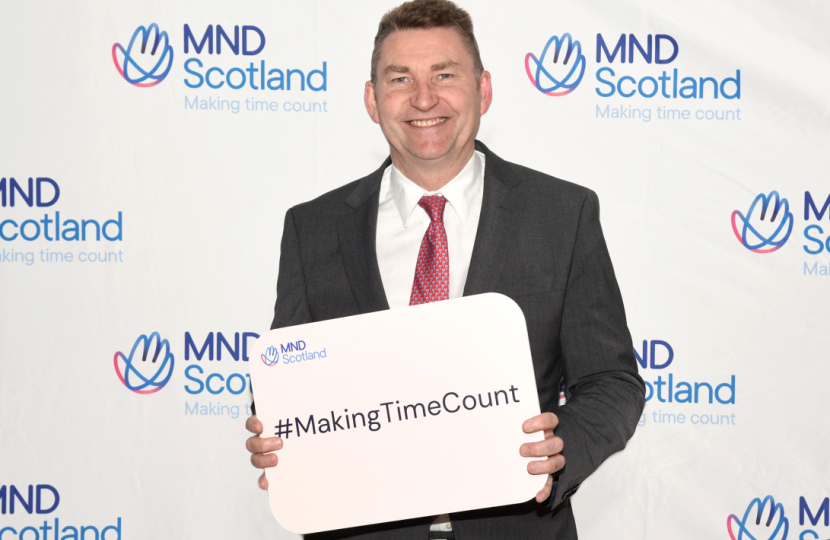
South Scotland MSP Brian Whittle joined a parliamentary reception to highlight the need for better social care for people with motor neuron disease (MND).
The MND Scotland event was hosted by Bob Doris MSP in the Garden Lobby of the Scottish Parliament on Tuesday, 16 April.
Attendees at the event heard from Bob Doris MSP, the Minister for Social Care, Mental Wellbeing and Sport, Maree Todd, and Brian Murphy, who was diagnosed with MND in 2019. MND Scotland’s CEO, Rachel Maitland, also highlighted the importance of people with MND getting the care that they need.
Guests, including 50 people directly impacted by MND, were joined by over 35 MSPs and members of MND Scotland’s Board of Trustees.
Maree Todd, the Minister for Social Care, Mental Wellbeing and Sport, addressed the reception and shared an insight into the National Care Service Bill, which was introduced in 2022 but will not be operational until 2029.
Brian Murphy from Glasgow, who was diagnosed with MND at the age of 47, shared his very personal experience of living with MND and how he wants support to be improved for people living with the disease.
Brian Whittle MSP said: “It was a pleasure to attend MND Scotland’s event at Holyrood which emphasised that people with MND don’t have time to wait for action.
I’m glad that MND Scotland were able to bring everyone together to raise awareness of the need for fast tracking social care to give people with MND as much quality time as possible with their friends and family.
It was a privilege to meet with people who have been diagnosed with MND at the event. Having already seen the impact of MND on campaigners and my friend Doddie Weir, I know how hard it can be for those diagnosed with the condition and for those caring for them. I’m committed to supporting MND Scotland’s effort to make time count for people with MND.”
Rachel Maitland, MND Scotland’s Chief Executive, said: “I welcome the support of Brian Whittle MSP and everyone that attended the reception to hear more about the devastating impact of this brutal disease.
“People affected by MND need a social care system which is fast enough, and flexible enough, to cope with changing needs as the disease progresses. We will not see the National Care Service operational until 2029. In the next five years, hundreds of people in Scotland will have been newly diagnosed with MND and died from the illness. We cannot wait for a National Care Service. Change is needed now.”
MND is a rapidly progressing terminal illness, which stops signals from the brain reaching the muscles. This may cause someone to lose the ability to walk, talk, eat, drink or breathe unaided.

